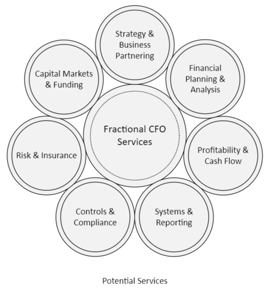In today's dynamic business world, financial leadership is indispensable for the success of organizations, big and small. The evolving business terrain necessitates adaptable financial leadership, which has led to the rise of a transformative role—the Fractional CFO (FCFO). Offering strategic financial wisdom without the constraints of a full-time commitment, FCFOs have become catalysts for growth, particularly for small and mid-sized businesses. This article explores the extensive knowledge and skills FCFOs need, elucidates their potential services, and proposes effective strategies to empower businesses in strategic decision-making, ultimately maximizing their value.
Knowledge and skills required for the CFO role
FCFOs should possess the necessary skills to navigate within both the controller and treasurer domains. Essential knowledge and skills of FCFOs include:
- Broad Financial Expertise: A firm grasp of diverse financial management concepts is crucial for FCFOs. They must be adept at accounting principles, financial modeling, budgeting, strategic financial planning, and cash flow management. The ability to distill complex financial data into actionable business insights is vital to their role.
- Extensive Business Knowledge: A well-rounded FCFO extends beyond the confines of financial expertise. They must deeply understand various business sectors such as operations, sales, marketing, and HR, and how they intersect with finance. This comprehensive knowledge helps align financial decisions with overarching business strategies.
- Superior Communication Skills: Communicating intricate financial information to a non-financial audience is a significant aspect of an FCFO's role. They should be able to convey data in a clear and relatable manner using exceptional verbal, written, and visual communication skills.
- Regulatory Compliance Knowledge: It's imperative for FCFOs to have a deep understanding of relevant local, state, and federal financial regulations. Ensuring the company's adherence to these regulations helps avoid legal complications and fosters stakeholder trust.
- Proficiency in Technology: In the era of digitization, FCFOs must be adept with finance-specific software, data analysis tools, and be willing to embrace advancements like artificial intelligence and machine learning. Such tech-savviness can bolster financial forecasting, risk management, and strategic decision-making.
- Strategic Leadership: FCFOs should exhibit leadership qualities that go beyond the numbers. They must be able to design and implement effective financial strategies, steering the company toward sustainable financial success.
- Adaptability: With a portfolio that often includes businesses from diverse industries, FCFOs need to swiftly adapt to a company's unique culture, business model, and specific financial requirements.
- Negotiation and Decision-Making Prowess: FCFOs often need to negotiate contracts and make high-stakes financial decisions. Excellent negotiation and decision-making skills are therefore critical.
- Financial Forecasting Ability: The ability to accurately forecast financial trends and results is crucial. This allows the business to plan and manage its resources effectively.
Potential CFO services you can provide
FCFO services often include managing a company's finances, financial planning, managing risk, and record-keeping. FCFO services vary depending on the specific needs and circumstances of the organization they are serving. The potential services associated with the role are listed and depicted in the diagram below.
- Strategy & Business Partnering: This involves strategic financial planning, in alignment with the company's goals and vision. FCFOs often work closely with other executives to create and implement strategies that help achieve business objectives.
- Financial Planning & Analysis: This entails the review, monitoring, and management of budgets, forecasts, and financial reports. The FCFO is often responsible for identifying trends and opportunities for performance improvement, cost reduction, and systems enhancement.
- Profitability & Cash Flow: This refers to ensuring the company's financial growth, managing the company's cash flow, and making decisions about capital investments, funding, budgeting, and forecasting.
- Systems & Reporting: Ensure the integrity of systems and data, overseeing the preparation of all financial reporting and maintaining up-to-date knowledge of organizational policies and procedures, federal and state policies and directives, and current accounting standards.
- Controls & Compliance: Oversee compliance with financial regulations and standards, instituting internal control mechanisms to prevent fraud, errors, and financial mismanagement.
- Risk & Insurance: This involves overseeing the risk management and insurance functions of the organization. FCFOs often work with risk management professionals to identify and mitigate potential financial risks to the organization. They also manage insurance policies and ensure adequate coverage for organizational risks.
- Capital Markets & Funding: Engage with the capital markets to raise debt or equity as required, overseeing the organization's capital structure. They are often responsible for dealing with investors, financial institutions, and analysts.

The goal of the FCFO should be to protect the company’s revenues, profits, and assets to achieve financial control and sustainable growth. This will require them to stay up to date with market trends and changes in business practices and regulations. They often manage a finance team and report directly to the organization’s CEO.
Effective CFO strategies
The success of FCFOs depends on their ability to integrate financial expertise with business acumen and strategic thinking. Creating effective strategies as an FCFO requires a comprehensive approach that aligns financial goals with overall business objectives. By adopting this multifaceted approach, a successful FCFO can play a crucial role in driving the company's growth and financial stability. Effective strategies include:
- Construct a Detailed Financial Blueprint: A robust financial plan is a top deliverable from an FCFO. This should encompass strategic budgeting, detailed forecasting, comprehensive cash flow analysis, and contingency planning. It must dovetail with the company's strategic goals, providing a clear route to their realization.
- Implement Streamlined Reporting Systems: FCFOs need to establish efficient reporting systems. These systems should clarify financial data, making it more accessible and comprehensible for stakeholders across the company.
- Proactive Risk Management: Identifying, evaluating, and mitigating financial risks forms a critical part of the FCFO's role. They must establish robust internal controls and risk management strategies to safeguard the company’s assets.
- Enhance Profitability: A primary objective for any FCFO should be to enhance profitability. This could be accomplished by identifying cost-saving opportunities, increasing operational efficiency, and implementing effective pricing strategies.
- Manage Capital Acquisition: FCFOs play a crucial role in identifying potential sources of capital and managing the acquired capital effectively to ensure sustainable growth.
- Establish and Monitor Performance Metrics: They should set up key financial and non-financial performance metrics and consistently track them to ensure alignment with the company's strategic objectives.
- Facilitate Strategic Decision-making: With their broad financial expertise, FCFOs should facilitate strategic decision-making that aligns with the company's financial health and goals.
An effective FCFO should include these four core services.
- Review of Financials: Provide your perspective of what you are seeing in the Statement of Cash Flow, Profit and Loss, and Balance Sheet at a high level. Include the good, the bad, and the ugly.
- Cash Flow Forecasts: With good forecasts, you can optimize cash flow to maintain sufficient liquidity for day-to-day operations.
- Budgets & Projections: They play a crucial role in helping businesses effectively manage their finances, make informed decisions, and achieve their financial objectives.
- Goal Setting: Align financial goals with the overall business strategy.
The role of the FCFO is multifaceted and crucial in today’s complex business world. As they expand their skills and knowledge, from intricate financial expertise to visionary leadership, and apply the strategies delineated in this article, they can effectively guide businesses towards robust financial health and success. With the rise of the FCFO, quality financial leadership has become accessible for businesses of all sizes, driving growth, strategy, and value maximization.
.png?width=150&height=63&name=TWRlogo-regmark_blueblack%20(1).png)
.png)










Do you have questions about this article? Email us and let us know > info@woodard.com
Comments: